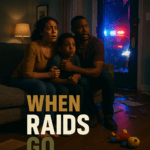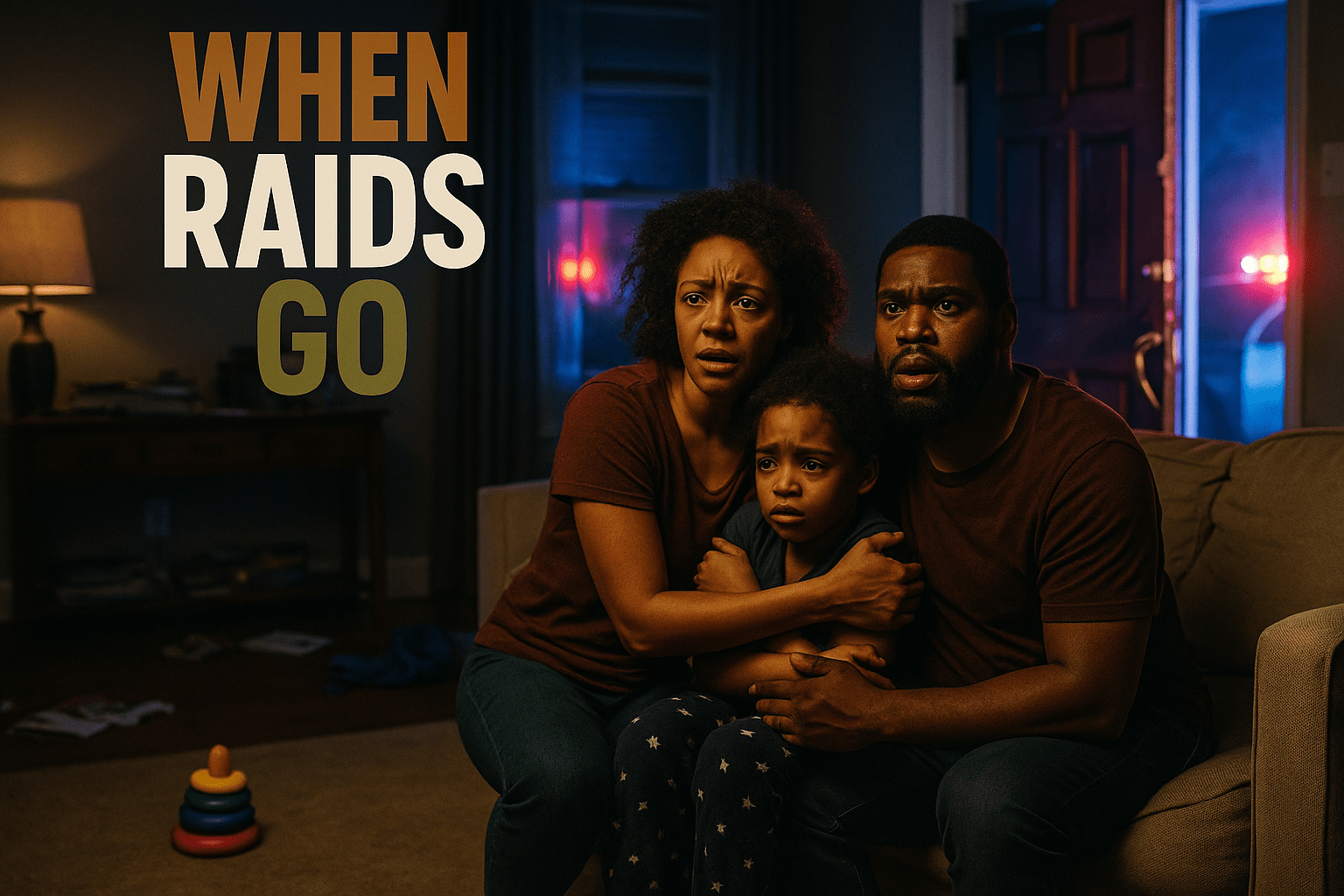

When Raids Go Wrong: Atlanta's Fight for Justice
By Darius Spearman (africanelements)
Support African Elements at patreon.com/africanelements and hear recent news in a single playlist. Additionally, you can gain early access to ad-free video content.
Atlanta Family's Legal Battle Against the FBI
An Atlanta family, whose home was wrongly raided by the FBI in 2017, will finally have their lawsuit revived by the Supreme Court. On Thursday, June 12, 2025, the Supreme Court unanimously ruled to revive the lawsuit filed by the Atlanta family (seattletimes.com). This decision brings a glimmer of hope for justice after years of fighting.
The raid occurred in the predawn hours of 2017. Armed FBI SWAT team members smashed in a front door, set off a flashbang grenade, and pointed guns at the couple and their 7-year-old son (seattletimes.com). They quickly realized they were at the wrong house. The FBI agents uncuffed the homeowner, Cliatt, and left for the correct house, where they executed the warrant and arrested the intended suspect (hotsr.com). The agent leading the raid returned later to apologize and leave a business card with a supervisor's name. However, the family received no compensation from the government, not even for the damage to the house (hotsr.com). This lack of accountability has fueled their determination to seek justice through the courts.
Understanding the Federal Tort Claims Act (FTCA)
Federal Tort Claims Act (FTCA): This law allows individuals to sue the United States federal government for torts committed by federal employees acting within the scope of their employment. It provides a limited waiver of the government's sovereign immunity, making it possible to seek damages in certain circumstances where it would otherwise be impossible. Source: npr.org
Navigating Sovereign Immunity and the FTCA
The family's lawsuit hinges on the Federal Tort Claims Act (FTCA). This act is a law that allows individuals to sue the United States federal government for torts committed by federal employees acting within the scope of their employment. The FTCA provides a limited waiver of the government's sovereign immunity, making it possible to seek damages in certain circumstances where it would otherwise be impossible. The federal government is generally immune from being sued, except in certain circumstances set out by Congress (npr.org). This principle stems from the idea that the sovereign (the state) cannot commit a legal wrong and therefore cannot be subjected to the jurisdiction of its own courts without its permission.
Congress intentionally changed the law in 1974 to create an exception to the government’s immunity for conduct by law enforcement officers (washingtonpost.com). This change was specifically to ensure a remedy for innocent victims of mistakes or wrongdoing, such as wrong-house raids. The FTCA's liability rule incorporates state law. This means that in most cases, there is no conflict for the Constitution's Supremacy Clause to resolve when determining liability (scotusblog.com). The Supreme Court's decision means that lower courts must consider whether claims under the FTCA are barred by the discretionary-function exception. If not, they must determine whether a “private individual under like circumstances” would be liable under state law (scotusblog.com).
Understanding Sovereign Immunity
Sovereign Immunity: This legal doctrine protects the government from being sued without its consent. This principle stems from the idea that the sovereign (the state) cannot commit a legal wrong and therefore cannot be subjected to the jurisdiction of its own courts without its permission. While this makes suing the government generally difficult, exceptions like the Federal Tort Claims Act exist to allow lawsuits in specific circumstances. Source: npr.org
The Supremacy Clause and Legal Precedent
The Supremacy Clause, found in Article VI of the U.S. Constitution, establishes that the Constitution, federal laws made pursuant to it, and treaties made under its authority, constitute the “supreme Law of the Land.” This means that state laws that conflict with federal laws are preempted and invalid. The Supreme Court found the 11th U.S. Circuit Court of Appeals was wrong to toss out the case based in part on the Supremacy Clause (washingtonpost.com). Justice Gorsuch explained that “Because the FTCA’s liability rule incorporates state law, in most cases — including this one — there is no conflict for the Constitution’s supremacy clause — which provides that the Constitution and federal laws are the 'supreme Law of the Land' — to resolve” (scotusblog.com).
This Supreme Court ruling, while a victory for the victims in allowing their lawsuit to proceed, does not fully resolve key questions about federal liability. It also does not definitively clarify when law enforcement officials can be held accountable for mistakes in wrong-house raids. The Court explicitly declined to decide “whether and under what circumstances the discretionary-function exception bars suits for wrong-house raids and similar misconduct” (scotusblog.com). This leaves the broader legal precedent somewhat unsettled. It indicates that future cases will likely continue to grapple with the limits of government liability in such situations. Justice Gorsuch acknowledged that “different lower courts have taken different views of” the discretionary-function exception (scotusblog.com). He also noted that “important questions surround whether and under what circumstances that exception may ever foreclose a suit like this one” (scotusblog.com).
Understanding the Supremacy Clause
Supremacy Clause: Found in Article VI of the U.S. Constitution, this clause establishes that the Constitution, federal laws made pursuant to it, and treaties made under its authority, constitute the “supreme Law of the Land.” This means that state laws that conflict with federal laws are preempted and invalid. Source: washingtonpost.com
Seeking Compensation and Impacting Law Enforcement Practices
The available data does not explicitly detail the specific remedies or monetary damages the family is seeking through their revived lawsuit. However, the nature of the Federal Tort Claims Act (FTCA) and the context of the case suggest they are pursuing compensation for the harm and trauma caused by the wrong-house raid. The FTCA allows for claims when law enforcement officers commit torts such as assault, battery, false imprisonment, and false arrest (washingtonpost.com). This implies that the family is seeking damages related to these alleged actions. The ultimate outcome could involve a settlement or a court-ordered payment if the lawsuit is successful. The lawyer for the victims stated that Congress intentionally changed the law to “make sure that there's a remedy for the innocent victims of your mistake or wrongdoing,” implying the pursuit of compensation (washingtonpost.com).
While the Supreme Court's decision allows the lawsuit to proceed, the available data does not explicitly state whether this ruling will directly influence FBI or police procedures to prevent future wrong-house raids. However, the renewed legal avenue for victims to seek accountability could indirectly pressure law enforcement agencies to review and potentially revise their protocols for planning and executing raids. This is especially true concerning intelligence gathering, address verification, and the use of force. Public interest groups from across the political spectrum urged the justices to overturn the lower court's ruling. They stated that it severely narrows the legal path for people to file law enforcement accountability cases against the federal government (washingtonpost.com). This indicates that allowing the lawsuit to proceed could open more avenues for accountability.
Other Botched Raids in Atlanta and Community Impact
Unfortunately, other instances of botched raids and mistaken identities by law enforcement have occurred in the Atlanta area. In June 2025, a SWAT team and Homeland Security searched a Mableton home, leading to the arrest of seven undocumented immigrants (atlantanewsfirst.com). Cobb County police stated that “no criminal activity was being alleged by the reporting party” for the initial reason for the search, though arrests were made for unrelated charges (atlantanewsfirst.com). In April 2023, Roswell police raided the wrong apartment without a knock or warrant (atlantanewsfirst.com).
In July 2025, rapper GloRilla was arrested for felony marijuana possession after her home was burglarized. This sparked debate on law enforcement's treatment of crime victims (fox5atlanta.com). Attorney Tom Church questioned the basis for the search warrant in GloRilla's case. He stated that officers claimed to smell marijuana, despite the existence of legal hemp products that smell similar (fox5atlanta.com). These incidents highlight a pattern of questionable law enforcement practices. They also raise concerns about community trust, especially within African American communities. The ongoing legal battles and public scrutiny underscore the urgent need for greater accountability and reform in policing.
ABOUT THE AUTHOR
Darius Spearman has been a professor of Black Studies at San Diego City College since 2007. He is the author of several books, including Between The Color Lines: A History of African Americans on the California Frontier Through 1890. You can visit Darius online at africanelements.org.
